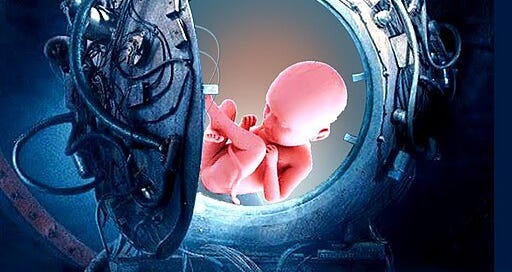Spong.
First, thank you to Carl Trueman for providing this month’s essay. When we started this site, we had a conversation on which living intellectuals we actually admired. We both simultaneously said, “Carl Trueman.” We then fell into an uncomfortably long silence before we came up with a few other names. It was great to see him here.
Carl’s essay recalls us to our original subject: how to face the onrushing explosion of technology without losing our humanity. He makes the excellent point that in order to answer that question you have to first know what humanity is. This is no simple thing.
Aldous Huxley’s brilliant novel Brave New World dramatizes the complexities. The story takes place in a future Britain where babies are hatched in incubators and genetically designed to fulfill the duties of their class. Sex has become an empty pleasure and the problem of meaninglessness is dealt with by feeding on the joy-inducing tranquilizer SOMA.
The dystopia is horrific. But when dissatisfied denizens visit the reservations where old-fashioned “savages” live, they find a living past full of ignorance, violence, superstition and suffering. The modern dystopia was a bad solution to a real problem.
One “savage,” who has humanized himself through reading Shakespeare, is now out of place in both the primitive past and the dystopian present. There is no place to live in-between.
So it is with technology. Without it, we suffer from ignorance, disease, unwanted pregnancies, sterility, and so on. With it, we risk being transformed into soulless androids. And it’s not clear there’s a place to live in-between.
Recently, I discussed these matters with Michael Hanby, an eloquent Catholic philosopher of science. He said we could not stop the march of technology because it advanced faster than we could think about it. In fact, we have virtually outlawed thinking about it! The Presidential Commission on Biological Ethics, created by George W. Bush to study the ethics of using embryonic stem cells in medical studies, disappeared during the Obama years and has not been seen since.
“There’s something about the process of technological development… that takes on a kind of life of its own, that each of us individually is more or less powerless to do anything about,” Hanby told me. “How do we then prevent ourselves from being like the citizens of the brave new world who don’t know what they’re missing? And to me, the answer is that we have to try to understand it.” Essentially, each one must save himself by knowing what choices to make.
Which brings us, as Carl says, back to Christianity. C. S. Lewis said of Christ, "He died not for men, but for each man. If each man had been the only man made, He would have done no less."
Neither would He have done more. Each of us is born with a soul of his own with which to start the world again. It is our most precious treasure, but also our most profound responsibility.
Love, Dad





The new song, The song of Redeeming love- has been, is, and forever will be
the song that says: Without him,
We are but dust. With him, we are everything.
Oh my, dear Lord help us!